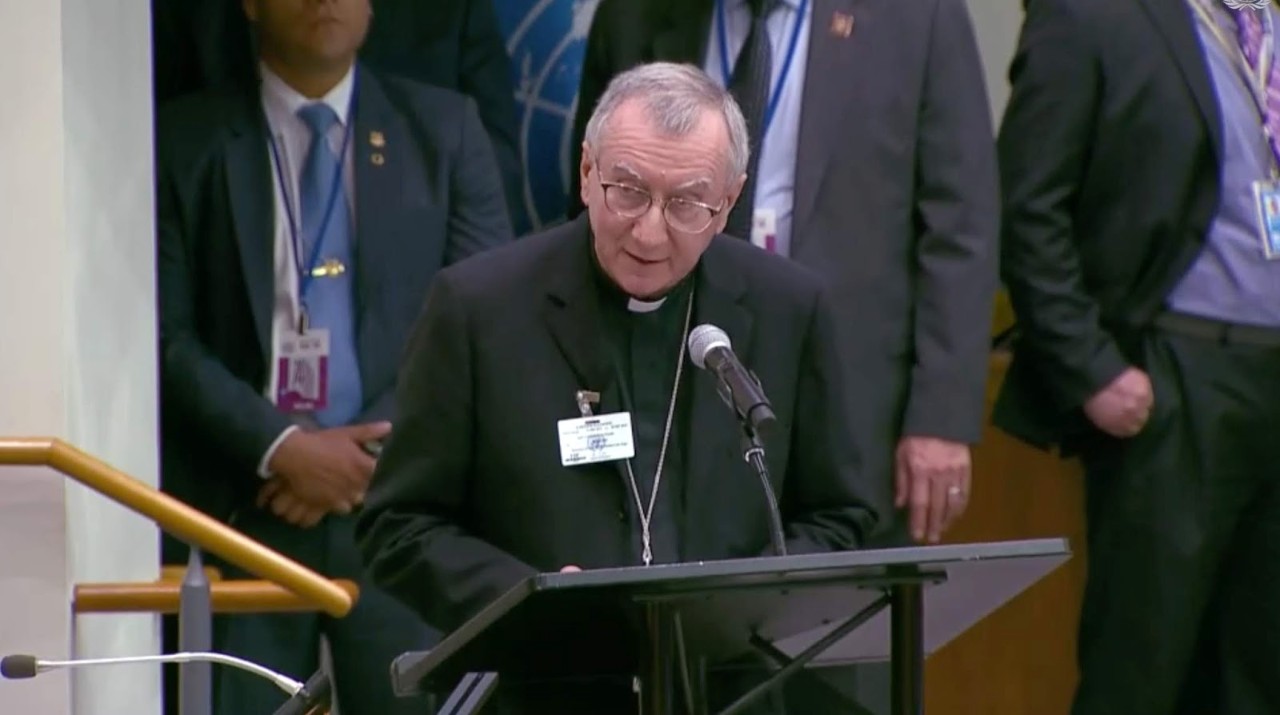Statement By His Eminence Cardinal Pietro Parolin At Universal Health Coverage
 Eminence Cardinal Pietro Parolin At Universal Health Coverage (L'osservatore Romano)
Eminence Cardinal Pietro Parolin At Universal Health Coverage (L'osservatore Romano)
Statement by His Eminence Pietro Cardinal Parolin
Secretary of State of the Holy See
Head of the Delegation of the Holy See to the
Seventy-Fourth Session of the UN General Assembly
2019 High-Level Meeting on Universal Health Coverage “Universal Health Coverage: moving together to build a healthier world”
New York, 23 September 2019
Mr. President,
The Holy See is pleased to participate in this first High-level Meeting on Universal Health Coverage.
The theme of “Universal Health Coverage: moving together to build a healthier world” reminds us that, as one single human family, we share the duty to care for one another, especially the poorest and the helpless. To ensure that all people have access to the medical attention that they need is a concrete expression of solidarity, social justice and the equitable sharing of the common good. In a word, universal access to healthcare is an important component of sustainable and integral human development.
As Pope Francis often reiterates “health is not a consumer good, but rather a universal right and therefore access to healthcare services cannot be a privilege”¹. The right to health is in fact universally recognized as a basic human right and is understood as comprising the health of the person as a whole and of all persons during all stages of development of their life. The right to health is thus inextricably linked with the right to life and it can never be manipulated as an excuse to end or dispose of a human life in whichever point in the entire continuum of his or her existence, from conception until natural death.
The world has yet to fulfil its promise of implementing, at all levels, measures to address the health needs of all. Half of the world’s population still lacks access to essential healthcare, whereas close to one hundred million people are pushed into extreme poverty each year due to health expenses. Worse still, as the most recent monitoring report on the implementation of Universal Health Coverage worldwide clearly shows, is that when there is no universal access to healthcare, the poorer the person is, the lesser access he or she has to healthcare. It goes without saying that we need to focus greater attention to the healthcare needs of the poorest and of all those who risk being left behind the most. Besides being a question of responding to a right denied, taking care of the basic healthcare needs of the poorest is key in breaking the vicious cycle of poverty from one generation to the next.
My Delegation further notes with concern that many persons living in vulnerable situations and often in particular need of healthcare, do not enjoy access to it. This applies, especially, for persons with disabilities, the elderly, the migrants in precarious situations and refugees. In certain places, women and children are also denied equal access to quality healthcare.
It is, moreover, vital that we join forces to implement policies that ensure, at affordable costs, the provision of essential medicines for all, and not to neglect the area of research and the development of treatments that, albeit not profitable from the financial point of view, are essential to saving human lives. In this regard, greater global solidarity in development assistance and technology sharing is most welcome. Most low-income countries need the support of the international community in order to overcome the funding shortfalls in this essential component of assuring the wellbeing of their respective populations.
Mr. President,
The declaration on universal health coverage adopted at the opening of this High-Level Meeting sets out important commitments to support the most vulnerable and to engage all relevant stakeholders in designing better health systems. As such, it represents a significant step forward in our common efforts to provide every man, woman and child with healthcare.
At the same time, the Holy See considers it most unfortunate that the adopted declaration includes the deeply concerning and divisive references to “sexual and reproductive health-care services” and “sexual and reproductive health and reproductive rights” as components of universal health coverage. In line with its reservations expressed at the international conferences held in Beijing and Cairo, the Holy See reiterates that it considers the phrase “reproductive health” and related terms as applying to a holistic concept of health, which embraces the person in the entirety of his or her personality, mind and body. In particular, the Holy See rejects the interpretation that considers abortion or access to abortion, sex-selective abortion, abortion of fetuses diagnosed with health challenges, maternal surrogacy, and sterilization as dimensions of these terms, or of universal health coverage.
The Holy See has never failed to support and to contribute towards achieving universal health coverage, especially through the approximately one hundred thousand Catholic healthcare institutions throughout the world, the majority of which are serving vulnerable populations living under adverse conditions. It is therefore my Delegation’s hope that the deliberations of this High-level Meeting will bring us together as a family of nations united in respect for every human life.
Thank you, Mr. President.
1 Pope Francis, Address to the members of Doctors with Africa (CUAMM), Vatican City State, 07 May 2016.
Source: holyseemission.org




